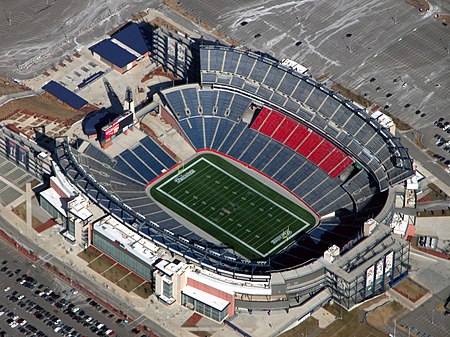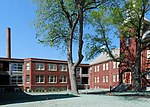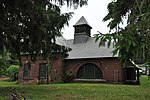Gillette Stadium

Gillette Stadium is a multi-purpose stadium located in the town of Foxborough, Massachusetts, which is 22 miles (35 km) southwest of downtown Boston, Massachusetts and 18 miles (29 km) northeast of Providence, Rhode Island. It serves as the home stadium and administrative offices for both the New England Patriots of the National Football League (NFL) and the New England Revolution of Major League Soccer (MLS). It opened in 2002, replacing the adjacent Foxboro Stadium. It also served as the home venue for the University of Massachusetts (UMass) Minutemen football team in 2012 and 2013, while on-campus Warren McGuirk Alumni Stadium underwent renovations; it continued to serve as a part-time home venue for higher attendance UMass games through 2018. Gillette Stadium's seating capacity is 64,628, including 5,876 club seats and 82 luxury suites. The town of Foxborough approved plans for the stadium's construction on December 6, 1999, and work on the stadium began on March 24, 2000. The first official event at the stadium was an MLS soccer game on May 11, 2002, where the New England Revolution defeated Dallas Burn, 2–0. Jeremiah Freed was the opening band at the WBCN River Rave on June 9, making them the first band to play at the stadium. Grand opening ceremonies were held on September 9, when the Patriots unveiled their Super Bowl XXXVI championship banner before a Monday Night Football game against the Pittsburgh Steelers. The stadium was originally known as CMGI Field before the naming rights were bought by Gillette after the "dot-com" bust. Although Gillette was acquired by Procter & Gamble in 2005, the stadium retains the Gillette name. In September 2010, Gillette and the Patriots announced that their partnership, which includes naming rights to the stadium, would extend through the 2031 season. Additionally, uBid (a wholly owned subsidiary of CMGI until 2003) continued to sponsor one of the main entrance gates to the stadium.Gillette Stadium is served by special MBTA Commuter Rail service from Boston and Providence during events, plus regular weekday service via the Franklin/Foxboro Line, at Foxboro station. The Patriots have sold out every home game since moving to the stadium—preseason, regular season, and playoffs. This streak dates back to the 1994 season at Foxboro Stadium; by September 2016, it had reached 231 games. The stadium is owned and operated by Kraft Sports Group, a subsidiary of the Kraft Group, the company through which businessman Robert Kraft owns the Patriots and Revolution.The stadium is set to host several matches during the 2026 FIFA World Cup.
Excerpt from the Wikipedia article Gillette Stadium (License: CC BY-SA 3.0, Authors, Images).Gillette Stadium
Patriot Place,
Geographical coordinates (GPS) Address External links Nearby Places Show on map
Geographical coordinates (GPS)
| Latitude | Longitude |
|---|---|
| N 42.091 ° | E -71.264 ° |
Address
Gillette Stadium
Patriot Place
02071
Massachusetts, United States
Open on Google Maps






